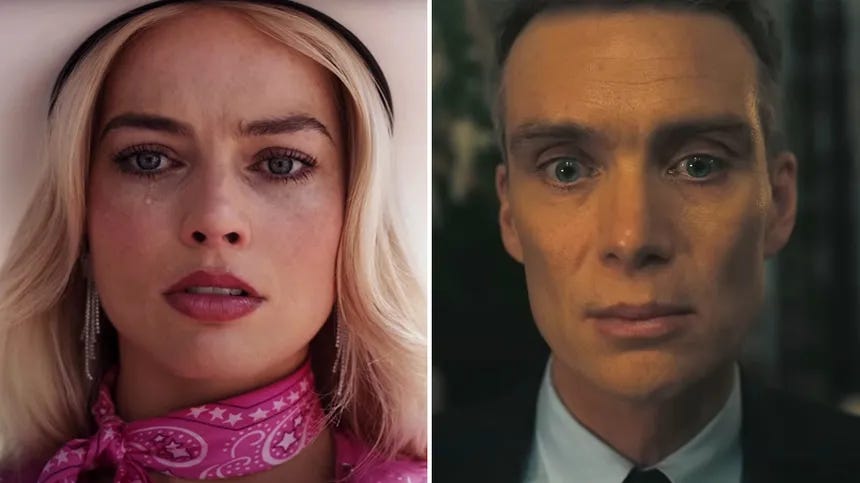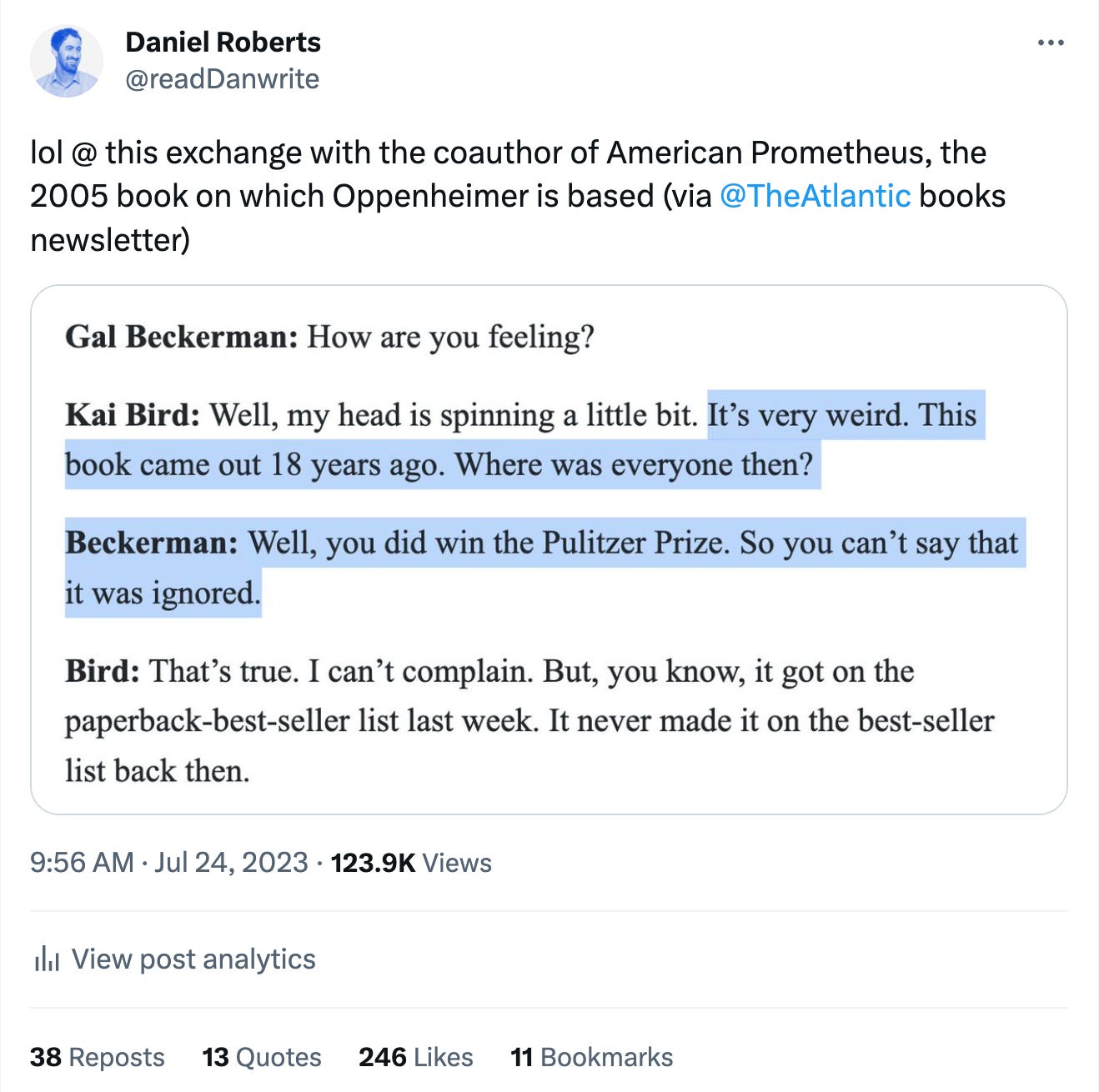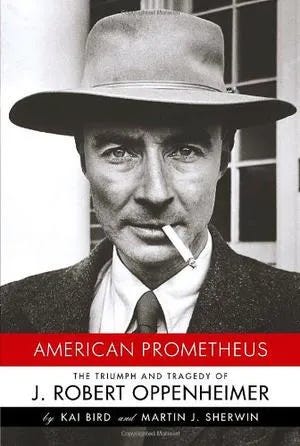Barbie and Oppie
Thinking about movie theaters, cultural moments, and book adaptations
Welcome back to Writing About Reading. This is Issue 21. If you enjoy it, please forward to your book nerd friends and encourage them to subscribe. This newsletter is free, and only exists for my pleasure and yours.
I’m reading (and loving) Little Monsters by Adrienne Brodeur, about a family on Cape Cod, and The Big House by George Colt Howe, about a family on Cape Cod. (Yes, yes, well, it’s summer.) I recently finished and really enjoyed The Guest by Emma Cline (a page-turner that artfully refuses to give any backstory or break from its trainwreck-style action), The Trackers by Charles Frazier (starts out like a Norman Rockwell painting, becomes a hardboiled noir), and This Thing Between Us by Gus Moreno (horror with a smart tech twist). Next up on my nightstand: The War for Gloria by Atticus Lish and The Thorn Birds by Colleen McCullough.
But in this issue of this books newsletter, I want to talk about movies.
What else but the two movies that have defined this summer in pop culture? “Barbie” and “Oppenheimer.” (Do stick around, there will be a small book angle here.)
I’ve wanted to write about these films since seeing them in the same week earlier this month: “Barbie” at a drive-in theater on Cape Cod (perfect environment for it) and “Oppenheimer” at an arthouse cinema (sadly not in the full-frame 70mm IMAX format Christoper Nolan demanded, but only 30 theaters in the U.S. have that capability anyway).
I really liked both movies. I doubt I have much to say about them that hasn’t already been said. My quick thoughts: “Barbie” is clever and winking (though not often laugh-out-loud), and it has a message that I didn’t find overwrought. Ryan Gosling’s Ken discovering the patriarchy is a brilliant scene. Will Ferrell was predictably annoying. Rhea Perlman was a lovely surprise. It strikes me as a very Jewish movie, though I’m not sure I can articulate why. I don’t know that it’s going to go down as any sort of classic, but it’s a perfectly weird comedy for right now. “Oppenheimer” was gripping visually and conceptually, and will stay with me a long time. How about those performances! Especially from supporting characters like Jason Clarke and David Krumholtz. I saw scattered complaints on social media that not enough happened in “Oppenheimer” and I had to laugh—they built, tested, and dropped a bomb, and that was all in the first half of the movie. I found the deposition drama of the second half equally compelling and thought-provoking. For a three-hour movie, it really moved. I didn’t check my watch or dare a bathroom break.
But I’m not a professional film critic, and I come not to review these two movies as much as to write about the cultural moment they created, and the joy of seeing movies in movie theaters.
I love that these two extremely dissimilar films will forever be tied to each other because of the timing of their release. Obviously Nolan’s film wouldn’t have done nearly as well if not for benefiting from the opulent Mattel marketing budget of Gerwig’s. As David Auerbach wrote, how often does a movie get the benefit of “branding an actual color as advertisement” and “being a self-compounding lifestyle brand, well beyond a toy”? But anecdotally, I also think each one buoyed the other, leading people to see both movies who I suspect would only have seen one.
Memes drove this; internet culture memed “Barbenheimer” into the zeitgeist.
“Barbie” hit $1 billion at the box office in a little over two weeks, making it the highest-grossing movie ever from a female director, and the highest-grossing Warner Bros. film ever (beating out, ironically, Christopher Nolan’s Dark Knight). “Oppenheimer” has brought in nearly $800 million globally, making it the No. 3 movie of the year (behind “Barbie” and “Super Mario”) and the second-highest-grossing R-rated movie ever (after “Joker”).
People came out for these movies. 22% of people who saw “Barbie” had not seen a movie in theaters since pre-Covid. (Not that much has changed since the below segment I did in late 2020.) I think they wanted to feel like part of the conversation.
More often, over the past decade, it’s been television series that create cultural moments. “Game of Thrones,” “Breaking Bad,” “Billions,” “Stranger Things,” “Succession.” I remember what it felt like to rip through the first season of “House of Cards” in a few days—I was like an addict. The plot itself was thrilling, and you knew you had to hurry or it might get spoiled by seeing something on Twitter, because everyone was watching; same for the final season of “Succession.”
Even though we talk about big shows together online, television is something we experience siloed, alone in our homes; movies in a theater we experience with other moviegoers.
My wife and I adore seeing movies in theaters—movies of all kinds, from quiet indie films to Marvel mega-franchises. We make time to see movies. And something that always surprised us, amid the “streaming revolution” that has led Hollywood to its current economic impasse and labor strike, is how many people our age (since long before Covid) say they never see movies in theaters anymore, and don’t care to. Some of them almost brag about it. I’ve heard friends say they won’t care if movie theaters die off. That kills me.
In the past 12 months we saw 22 movies in theaters. In reverse order: “Oppenheimer”; “Barbie”; “The Talented Mr. Ripley”; “Showing Up”; “Spider-Man: Across the Spider-Verse”; ‘You Hurt My Feelings”; “Guardians of the Galaxy 3”; “The Lost King”; “Are You There God? It’s Me, Margaret”; “Air”; “Emily”; “Ant-Man and the Wasp: Quantumania”; “My Favorite Year”; “The Fabelmans”; ”Aftersun”; “Babylon”; “The Menu”; “Black Panther 2”; “Tar”; “Don’t Worry Darling”; “See How They Run”; and “Mrs. Harris Goes to Paris.” I liked most of those (I’m pretty easy to please), but even the ones I didn’t were fun to see. (Except “Showing Up.” That was criminally boring.)
We also watched many movies at home, obviously, and the experience is never quite the same. Your phone is within reach; you pause to go to the bathroom or talk to each other about something mundane; you turn it off if one of you gets tired, and you might not finish it until days later, if at all. It’s disjointed. You blunt the movie magic.
I’m not optimistic the current strike will lead to anything much better in the long-run for writers and actors—the economics are only getting worse for everyone involved other than the big studios. But I do hope that the situation shines a light on how much work goes into a movie, how many people work hard on it.
I am painfully aware that this whole tribute may sound naive or Pollyannish, and you can roll your eyes and sneer at it if that’s what you choose to do. You could certainly tell me there’s absolutely nothing inspiring about these two summer blockbusters: one movie enjoyed a mega marketing blitz by a major toy brand, and the other reaped the benefit of a media narrative that paired them.
My broader retort would be that if you don’t care about movie theaters, picture a world in which they don’t exist, and all movies are released straight to your home television, always consumed on your couch with your phone in your hand.
Does that sound good to you?
Anyway, where do books come into all this? Only this tangential thought: “Oppenheimer” is based on an acclaimed 2005 biography of Robert J. Oppenheimer called American Prometheus. (I recommend this Atlantic interview with Kai Bird, one of the co-authors of the book; I tweeted out one funny part of it and ended up with one of those random unpredictable hit tweets.)
My wife, dad, and I all left “Oppenheimer” remarking at how fascinating the man’s life was. Fascinating enough to make me want to read a 720-page biography of him? It’s tempting, but I doubt I will—not only because I read very little nonfiction (ironic for someone who writes and edits nonfiction for a living), but also because I think it’s hard to feel motivated to read a book after you’ve already seen the movie. It’s like doing the steps in the wrong order.
Watching the film adaptation of a book you’ve already read and liked is logical and easy, and I’d argue that even when you didn’t love a book, when you see it’s been made into a movie it motivates you to see it, if only to see how they went about adapting it. But how often have you liked a movie, then gone back to read the book the movie was based on? In my case I can think of only a few examples where I saw the movie first, then read the source material: “No Country for Old Men”; “Fight Club”; “Cider House Rules” (my first John Irving, then he became one of my favorite authors); the Ted Chiang short story that inspired the movie “Arrival”; the Philip K. Dick short story that inspired “Minority Report.”
How often have you done it?
Since we’re on the subject of book-to-film adaptations, what are some of my favorites? Those rare cases where a great book is also made into a great movie? (Rare but not unheard of, but rare; I pray they never adapt The Secret History.) Since you asked, these are just a few of mine, off the top of my head: “Nobody’s Fool” (Paul Newman, Bruce Willis, Melanie Griffith!); “Remains of the Day”; “Adaptation” (from "The Orchid Thief); “American Psycho”; “Annihilation”; “It” (Chapter One better than Chapter Two); “The Green Mile”; “Misery” (yes, Stephen King books make great movies); “The End of the Tour” (not a great movie, to be clear, but a very faithful and perfectly cast adaptation of a book that was aweird choice to turn into a movie in the first place); “Never Let Me Go” (Ishiguro again); “A Hologram for the King”; “Lonesome Dove” the 1989 miniseries; Greta Gerwig’s “Little Women”; “Hamlet 2000”; and Cary Fukunaga’s “Jane Eyre.”
And to name some very good book-to-TV adaptations (at the risk of undermining everything I just wrote praising movies over streaming television): I thought the Hulu adaptation of Catch-22 a few years ago (that no one watched) nailed Joseph Heller’s novel; the Hulu series of Stephen King’s time-travel novel 11.22.63; the 2016 BBC “War & Peace”; “Silo” on Apple TV recently… there’s more to add, but that list is a good start.
Thanks for reading this far. And thanks for subscribing, sharing, and forwarding.
Related reading here from me on the Dune series and the 2021 film version.
Looking for a good film podcast? I recommend Cinephile with Adnan Virk.





I've seen lots of movies that I later then read the book it was based on. In almost every case, I ended up liking the book more. Of course, I can't think of any at the moment. I do remember the few times were I thought the movie was better. Silence of the Lambs (shockingly bad book for such a great movie), Jurassic Park (book was kind of a downer), and The Ninth Configuration (My all time favorite movie, but the book was kind of experimental and half baked, but still a good read).
Need to be away from life to focus on the screen..never read a book after seeing the movie- too many books, too little time…when will we get a guest column by your talented wife entitled “ Writing about Reading while Living with the Author of Writing about Reading”?